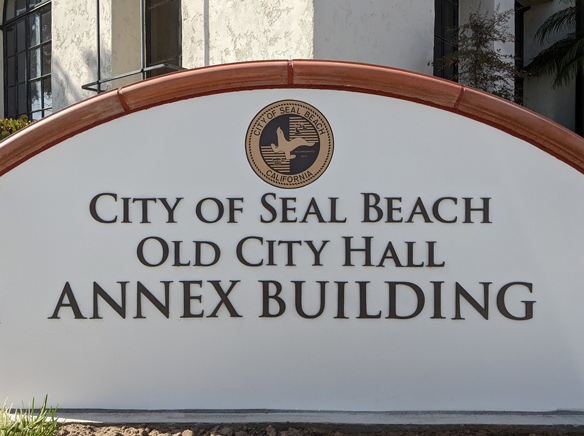The Seal Beach City Council voted 3-2 to approve a resolution that declared a College Park East property surplus land.
The declaration allows the city to sell the property, subject to council approval at a future meeting.
District Five Councilwoman Sandra Massa-Lavitt and District Four Councilwoman Schelly Sustarsic cast the dissenting votes.
Staff recommended selling the property in a staff report by Community Development Director Alexa Smittle.
Multiple residents of College Park East, however, argued that the property should not be sold until the city does something to address drainage and flooding.
After the meeting, Massa-Lavitt explained why she voted against the surplus land declaration.
“Even if the golf course accepted all the water from the pump station, so-called pump station, there will still be a need to have an auxiliary facility built,” Massa-Lavitt said.
Massa-Lavitt said she didn’t think the city should sell the house.
According to Massa-Lavitt, the property could provide revenue and housing. She also suggested the house could be a facade for a pumping station.
In a Feb. 14 email, District Two Councilman Thomas Moore explained why he vote in favor of the surplus land declaration.
“Based on the information we have available from the Engineering firm that looked at all areas of Seal Beach for flooding and our City Staff, the cost to correct the problem in College Park East would cost upwards of $30M to $50M which would include the proper drainage and a pump station,” Moore wrote.
“Since it is unlikely we will be able to get funding for this, it makes sense to start the process which would enable the city to put the house up for sale,” Moore wrote.
“This does not mean it will be sold as the item to sell the property will be on a future agenda. I requested staff to present a few options to alleviate flooding in College Park East as any future item that includes the sale of the property which they agreed to at the meeting last night.” Moore said.
Staff argued that selling the real estate would generate $950,000. The money, Smittle argued, would serve the most immediate needs at the West End Pump Station.
College Park East speaks
At least five College Park East residents sent emails to the city government that objected to the surplus land declaration. Copies of four of those letters were made available to the public at the meeting. A fifth letter was emailed to the council members and CC’d to the Sun.
Five CPE residents came to the meeting in person to express their opposition.
Susan Barembaum was the first to speak in person and was one of the authors of an email to the council.
Barembaum, a 37-year resident, said she learned from speaking with her neighbors that flooding has been an issue for CPE since the developer first built the neighborhood. Barembaum said the city approved the plans without proper grading.
Barembaum described her family’s experience with flooding in 1998, in 1999, and in 2019.
“Anyway, I ask that you not pass the resolution at this time until we can have further discussions,” Barembaum said.
“And we’d really like to know what the plan is for College Park East,” Barembaum said.
“We were promised that you would not ignore us that something would be done and it looks like nothing,” Barembaum said.
Other speakers called for the city to invest in mitigating the flooding problem in College Park East. One asked the council to wait until the two newly elected council members are sworn in later this month.
Gary Miller, a past member of the City Council, was among those who wrote letters about the potential impact to the neighborhood if the property was declared surplus land.
“All project alternatives identified at the March 25, 2019 City Council Meeting utilized the home at 4197 Ironwood Avenue, with cost estimates ranging from $10.7 million to $30.7 million. The upwards of $50 million identified in the February 13, 2023 Staff Report would be a significant increase in the 2019 project alternative cost estimates,” Miller wrote.
“As for the home at 4197 Ironwood Avenue, it should not be sold before the drain system is upsized utilizing a greater portion of the easement on the City’s side of the 10-foot storm drain easement. Once the upsizing is complete, then sell the home.,” Miller wrote.
“If $100,000 is spent annually to build the berm at the beach for the benefit of the beach homeowners, then make the $50,000 to $150,000 in needed improvements to maintain 4197 Ironwood Avenue for the benefit of Ironwood, Elder and Guava homeowners,” Miller wrote.
Jean Orland’s letter suggested a town hall meeting or other discussion format for College Park East residents and city staff could develop a plan to fix the flooding issue.
Council discussion
The council members discussed the issue at length. According to District Four Councilwoman Schelly Sustarsic, in 2028 AKM recommended putting a pump station in Bluebell Park.
Sustarsic asked about plans and alternatives for College Park East.
“We don’t have another plan in place,” Sustarsic said.
She said it really did feel like College Park East was being abandoned.
District Three Councilman Mike Varipapa suggested improving the property and letting the new council decide whether to sell.
District One Councilman/Mayor Joe Kalmick asked what would be a realistic figure to mitigate the flooding problem.
Public Works Director Iris Lee, referring to an earlier study, said the figure at that time was $30 million.
Sustarsic said she preferred to wait a year see what happens.
Background
“In July 2014, the City purchased a single-family home in the College Park East (CPE) neighborhood, located at 4197 Ironwood Avenue, for a net total of $762,676,” Smittle wrote.
“The purchase was the result of a series of actions, stemming back to the 2008 Master Plan of Drainage which estimated about $100 million, in 2008 dollars, of drainage infrastructure needs citywide,” Smittle wrote.
The Ironwood property was purchased to improve the city’s stormwater network, according to Smittle’s report.
“Since that time, additional focused studies have been performed, and the estimated costs to mitigate stormwater deficiencies have increased dramatically, with estimates upwards of $50 million. Given the extraordinary cost of completing these stormwater mitigation projects, there is little likelihood that the subject property would be used for the intended purpose,” Smittle wrote.
The city leased 4197 Ironwood Ave. However, the tenant left in October, according to Smittle.
“Based on a visual assessment, a minimum of $50,000 is needed to treat some basic deficiencies such as plumbing and flooring in the home, and about $150,000 would be needed to update the home to more modern standards and potentially increase the rental rate,” Smittle wrote.
“Based on the information from more recent infrastructure assessments, it is now clear that the property cannot perform the function it was originally intended for, as the City does not have the necessary resources to fund the improvements,” Smittle wrote.












